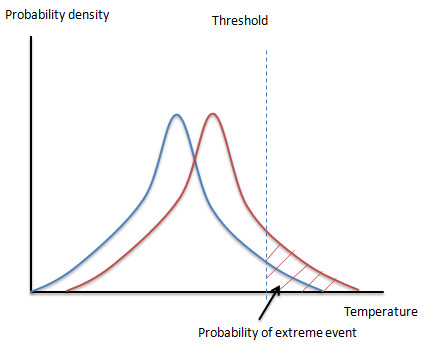Krugman é um dos economistas que leva a sério as alterações climáticas e as suas consequências. Abaixo três exemplos (devem lê-los na totalidade):
What happens is that the right tail gets fatter: the probability, and hence the frequency, of extreme events goes up.Two immediate implications. First, there will still be cold stretches: global warming shifts the distribution, it doesn’t eliminate the left side of the distribution. So there will still be cold spells; that proves nothing. Second, no individual weather event can properly be said to have been “caused” by global warming. Heat waves happened 30 years ago; there’s no way to prove that any individual heat wave now might not have happened even if we hadn’t emitted all that CO2.But the pattern should have changed: we should be getting lots of record highs, and not as many record lows — which is exactly what we do see. And we should be seeing 100-year heat waves and similar events much more often than history would have suggested likely; again, that’s what we actually do see.
We’re in the midst of a global food crisis — the second in three years. World food prices hit a record in January, .... but they’re having a brutal impact on the world’s poor, who spend much if not most of their income on basic foodstuffs....While several factors have contributed to soaring food prices, what really stands out is the extent to which severe weather events have disrupted agricultural production. And these severe weather events are exactly the kind of thing we’d expect to see as rising concentrations of greenhouse gases change our climate — which means that the current food price surge may be just the beginning. ...Still, food prices lagged behind the prices of other commodities until last summer. Then the weather struck..... The question then becomes, what’s behind all this extreme weather?To some extent we’re seeing the results of a natural phenomenon, La Niña — a periodic event in which water in the equatorial Pacific becomes cooler than normal. And La Niña events have historically been associated with global food crises, including the crisis of 2007-8. But that’s not the whole story. Don’t let the snow fool you: globally, 2010 was tied with 2005 for warmest year on record, even though we were at a solar minimum and La Niña was a cooling factor in the second half of the year.As always, you can’t attribute any one weather event to greenhouse gases. But the pattern we’re seeing, with extreme highs and extreme weather in general becoming much more common, is just what you’d expect from climate change.But the evidence does, in fact, suggest that what we’re getting now is a first taste of the disruption, economic and political, that we’ll face in a warming world. And given our failure to act on greenhouse gases, there will be much more, and much worse, to come.
"- Sent using Google Toolbar"
"With food prices on the table again, we’re going to have another debate about the role of speculators. .... But let me restate my basic position on all this.First of all, I don’t have any particular faith that markets necessarily get things right. Some readers may remember that I was almost all alone back in 2000-2001, declaring that the California energy crisis reflected market manipulation, not fundamental shortages; and I took a lot of heat back in 2005 for warning that we had a huge housing bubble.So this isn’t about a priori belief in markets; it’s about whether we see the “signature” of a speculation-driven price surge.
- Sent using Google Toolbar"

Sem comentários:
Enviar um comentário